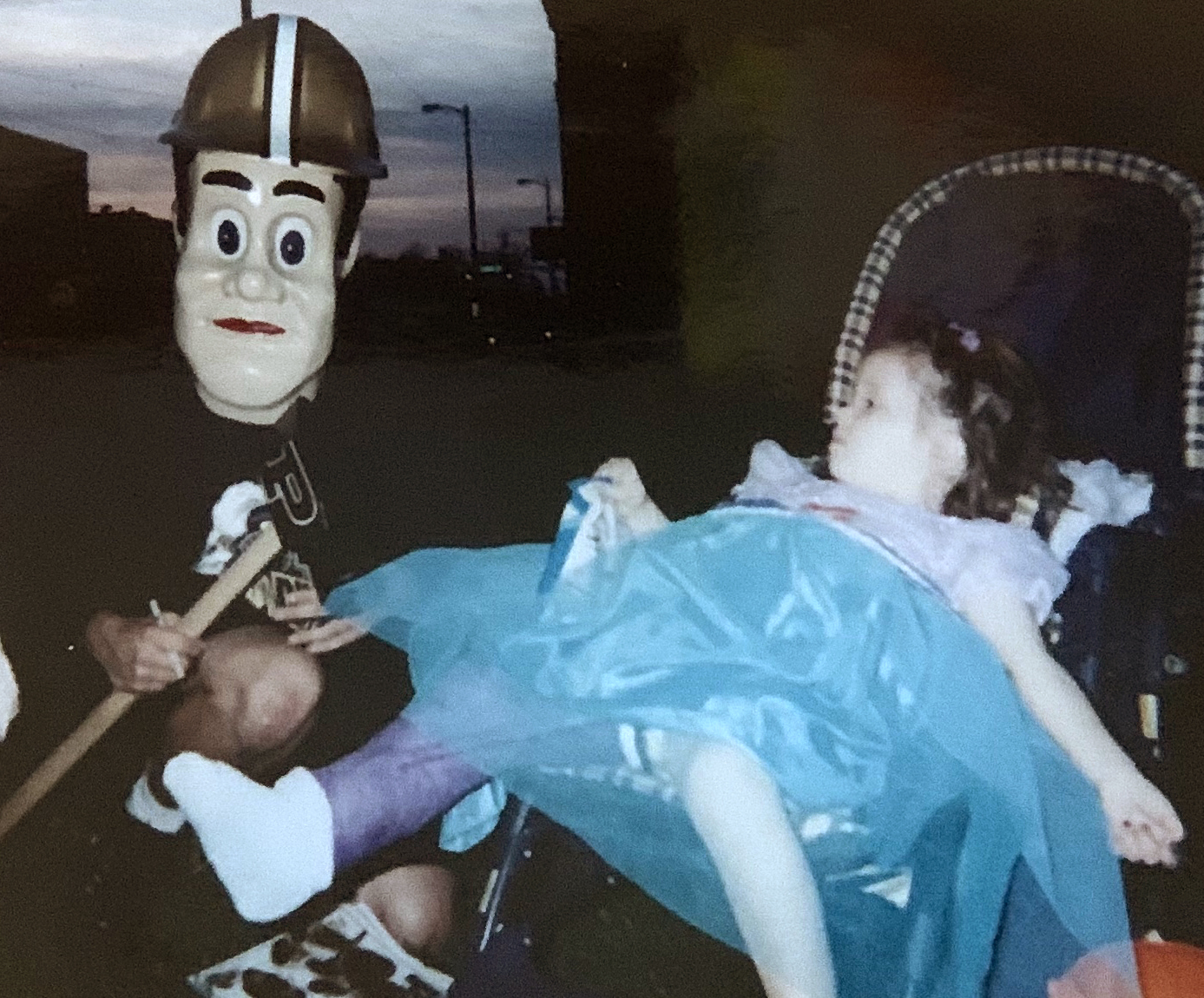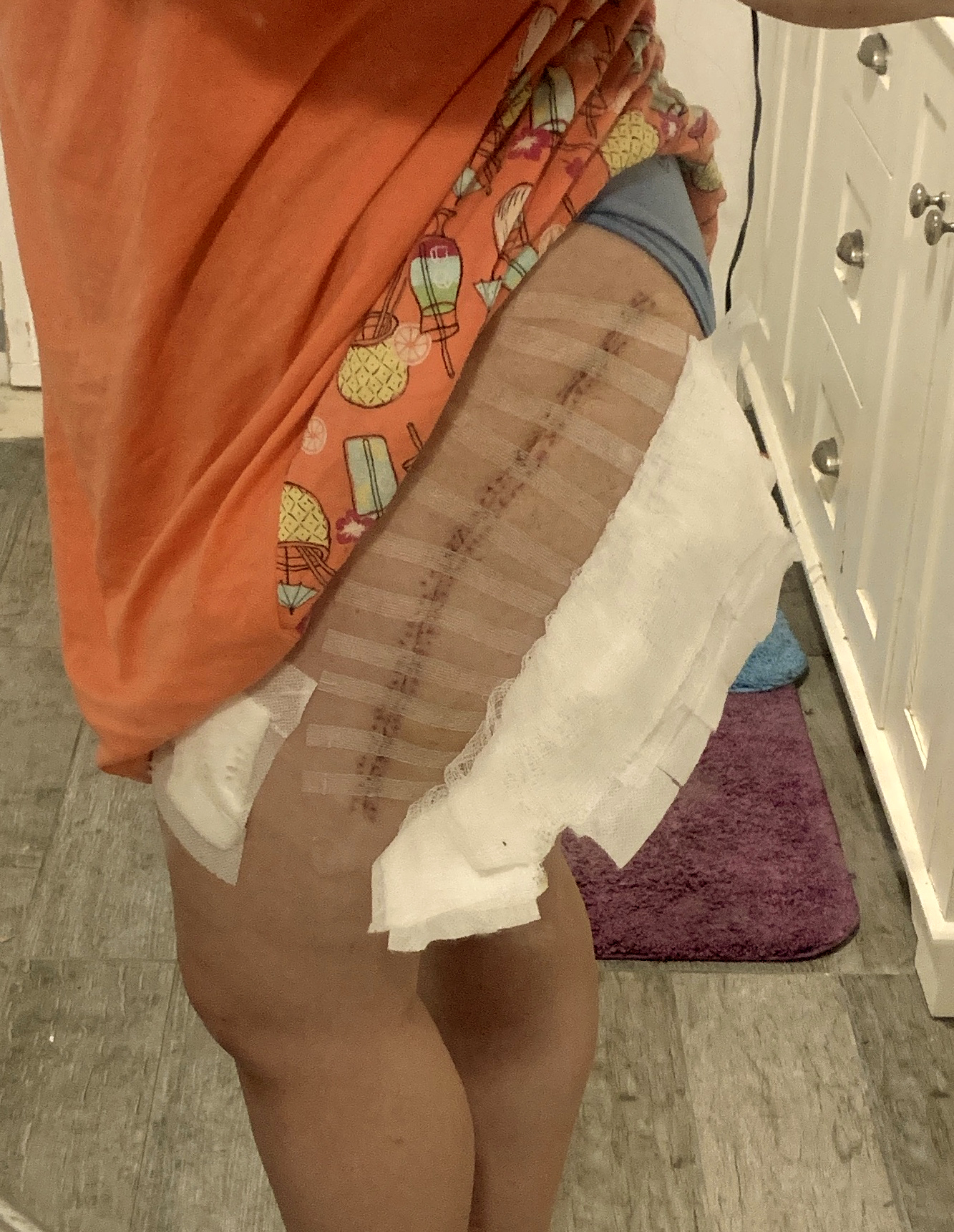Strength with a smile
Anthropology student's positive influence helped her win 2020 Tyler Trent award

Kamryn Dehn had no clue what she was in for when she sat down at her computer.
The Purdue senior’s parents had been teasing her for a week that something big was about to happen, but it was still a shock when she looked at the screen. Peering back at her via video chat was none other than Purdue President Mitch Daniels.
“I was a little scared at first because it’s a little intimidating when you see the president of your university on your computer screen,” chuckled Dehn, a senior from Frankfort, Indiana, majoring in anthropology and aquatic sciences.
Thankfully there was no reason to be fearful. Daniels informed her of two things: that Purdue hands out an honor called the Tyler Trent Courage and Resilience Award, and that he had selected her for this year’s award and accompanying $5,000 scholarship because of the consistent positivity she displayed while battling lifelong hip issues.
“My mom nominated me, and she didn’t tell me until I’d gotten it that day,” Dehn said.

Purdue shared a video of the moment, with Daniels praising Dehn for exemplifying the grit he wishes for every Boilermaker to display when facing adverse circumstances – much like the award’s namesake did while courageously battling terminal bone cancer.
“Kamryn, I was so inspired reading your story,” Daniels told her. “I’ve read it three times; I’ve told a whole bunch of people about it. We’re so proud of you. This particular scholarship recognizes something that we hope every Boilermaker, in one way or another, will develop.”
The annual award is presented to an undergraduate who has “encountered serious physical or similarly daunting adversity in their pursuit of higher education.” That is certainly a fitting description of Dehn’s life journey up to, and including, her Purdue experience. And yet the extent of her physical issues was seldom clear to acquaintances until she explained the full story.
“The medical challenges all through the beginning of her life that she has faced and then continued to experience at Purdue put her in a position where even if she could keep up with students, I would be impressed. But she’s not just keeping up, she’s excelling at what she’s doing,” said Julie Pluimer, Dehn’s academic advisor in the Department of Forestry and Natural Resources. “I’ve been in academic advising for over 10 years, and I’ll say that she’s one of the most determined students and one of the students I’ve advised who has faced some of the most serious hurdles that she has been able to overcome.”
Dehn had to battle to clear those hurdles at many different stages of her young life.
Born with hip dysplasia and suffering from a rare condition called Perthes disease, which restricted the blood flow to her right hip, Dehn frequently dealt with pain and mobility issues.
She was forced to wear a body sling as an infant and a body cast at age 2 following two hip surgeries.
Years later, a series of back spasms and severe hip and leg aches upended her promising swimming career, preventing her from competing as she once had.
“My leg pain had gradually been getting a lot worse throughout high school. And once I was in my junior year of high school, I kind of knew that college swimming wasn’t going to happen,” Dehn said. “My swim times were kind of just tanking. It was really sad to watch because I swam since I was 3, and it was something I really enjoyed.”
The pain did not subside once she arrived at Purdue – the university that has been a consistent presence throughout her life since nearly every adult relative is a graduate.
Lugging a heavy backpack around an expansive college campus caused pain and fatigue to become persistent issues.
“I think I eventually just got numb to how much pain I was in,” Dehn said. “That’s something that happened in high school, too. You eventually just get so used to the pain that you’re in that it becomes a part of your life. It sounds sad, but sometimes you don’t even realize you’re in pain until you think about it.”
After shredding a muscle in her hip socket during her sophomore year at Purdue, she was unable to walk for more than 20 minutes at a time. What followed was an agonizing, months-long wait to locate a surgeon and schedule a procedure to correct her hip issues. Dehn finally underwent extensive hip reconstruction surgery in St. Louis on June 28 of last year, about a year and a half after starting her search for a surgeon.

Over the course of the six-hour surgery, the doctor surgically broke and untwisted her femur, then spaced apart the broken pieces so that her legs would finally be the same length once the bone healed and grew to fill in the space. The surgery also involved reattaching the torn hip muscle; dislocating the hip and then shaving down the ball where spikes had formed; cutting and re-angling the trochanter; and reassembling the dislocated hip.
The foot-long incision from the procedure required 56 staples to close.
During her recovery, Dehn had to relearn how to walk and used crutches for six months before being able to walk independently. The rehabilitation process made it difficult to maneuver at the start of fall semester, but she insisted on remaining an active student – in large part because she wanted to stay on course in her majors.
One of her fall courses was Stacy Lindshield's “The Great Apes” primatology class – a learning experience Dehn enjoyed so much that it helped convince her to add anthropology as a second major. She started the fall using the BoilerCast lecture-capture service to attend Lindshield’s classes virtually before she was able to join in person a few weeks into the semester.
“I was so impressed with her ability to just seamlessly transition from doing the remote work to then showing up in the classroom when she was able to. It was such a smooth transition,” said Lindshield, an assistant professor of anthropology. “I know every student has their own special circumstances, and for some people it’s really challenging to be out of the classroom environment for an extended period of time, but she just beautifully joined the class and was a great contributor when she was there.”
In fact, Lindshield has since admitted Dehn to her team of student lab researchers. Dehn contributed to an award-winning poster project examining chimpanzee research last academic year. A few months ago, she asked to continue working with Lindshield’s research group after the coronavirus pandemic unexpectedly canceled a study abroad opportunity.
“I loved that,” Lindshield recalled. “I said, ‘Of course! You’re always welcome.’ She’s fantastic – a reliable, highly motivated, very competent and capable woman. It’s astounding to see that great, go-getter, positive attitude that she has.”
For those familiar with Dehn’s extracurricular calendar, it likely comes as no surprise that she would make that request. Even last fall when mobility was a major concern, she remained active in multiple campus organizations – and not just as a rank-and-file member.
She was service chair for the Wesley Foundation campus ministry and volunteer recruitment chair for Purdue Winterization, a campus service project that originates from Wesley. Even while Dehn was on crutches, she and her support team managed to sign up more than 1,000 volunteers. She also served as Ag Council representative for the Purdue American Fisheries Society.
“I guess the reason I kept being involved, even when I was not at my best, is even when I was little, something I always said to myself was even if you’re in pain, you should try to get into these activities because I wanted to be normal really badly,” Dehn said. “I really like the activities I’m involved in.”
If she ever felt physically overwhelmed by her active lifestyle, Dehn never voiced those concerns to Pluimer, who described Dehn as “a very supportive presence” as she has navigated her undergraduate experience.
“She’s never been one to complain; she’s never been one to kind of dwell on how hard that’s been for her,” Pluimer said. “And I’m sure she has her bad days like everybody else, but all I see from Kamryn is enthusiasm and positivity and this joy she takes in what she’s able to do on campus.”
In that way, Dehn’s academic advisor said she very much reflects the spirit of the award she just won and its namesake, who attracted a worldwide following in the fall of 2018 for his bravery during a fatal fight.
“Based on what I had seen about Tyler Trent, he was always so positive and he wasn’t focused on himself. And so, in spite of the life-and-death hardship that he was facing, there was still that motivation that ‘I want to be present and I want to be positive and I’m not focusing on myself,’” Pluimer said. “I would say Kamryn exemplifies that. She’s got a smile every time that she comes into the office.”